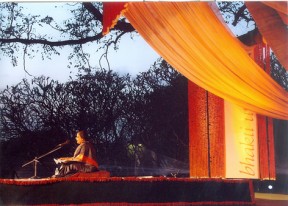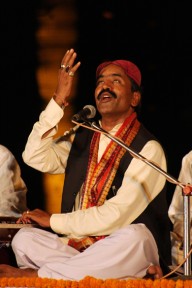We live in troubled times. We gasp in horror at the scams and scoundrels who surface every now and then, begin to voice our hopes when people like Anna Hazare talk of reform and wait for another round of media blitzkrieg to unite us emotionally – even if it is the next Indo-Pak cricket face off. As clichéd and cynical as this may sound, it is only faith that keeps us alive and that, perhaps, is what defines the success of the Bhakti Utsav that is held at the sprawling Nehru Park in Delhi in April every year.
Bhakti Utsav is organised by Seher, a cultural NGO, that organises some of the most successful festivals in the city – the Ananya Dance Festival and the South Asian Bands festival at Purana Qila – apart from countless artists’ camps in the country. It is the Bhakti Utsav, however, that has Seher’s stamp all over it – they steer clear of celebrity performers and spend almost a year putting together a roster of devotional music from every nook of the country- sometimes even beyond.

 Ironically, or it may be the signs of the times, Bhakti Utsav is as relevant today as it was when conceived nine years ago. Sanjeev Bhargava, the man behind Seher, says that after the Godhra carnage in 2002, there was a need to reaffirm the faith in peaceful co-existence. “Delhi, as we all know, is this huge melting pot where you are bound to meet all sorts of people. I was asked by CM Sheila Dixit to design a festival that could encompass all faiths and hence Bhakti Utsav was born. All faiths co-exist in the Bhakti tradition after all.”
Ironically, or it may be the signs of the times, Bhakti Utsav is as relevant today as it was when conceived nine years ago. Sanjeev Bhargava, the man behind Seher, says that after the Godhra carnage in 2002, there was a need to reaffirm the faith in peaceful co-existence. “Delhi, as we all know, is this huge melting pot where you are bound to meet all sorts of people. I was asked by CM Sheila Dixit to design a festival that could encompass all faiths and hence Bhakti Utsav was born. All faiths co-exist in the Bhakti tradition after all.”
The choice of the venue- Nehru Park – was equally significant. As opposed to a claustrophobic auditorium, the organisers decided to make “the base of the thickly branched tree” they found in the park as a stage for the fest and keep the entry free – another reference of how compassion unites one and all.
In the past few editions of the Bhakti Utsav, one has seen people of all age groups – from the elderly in wheelchairs and wide-eyed teenagers to chiffon clad ladies and regular joggers – throng the venue. And this time as well, the festival slated to take place from April 22 till April 24 promises to be no different.
On April 22, the evening will begin with Kerala’s KM Vasudevan Namboothiri and ON Damodaran Namboothiri performing Rig Vedic chanting. An appropriate beginning for the fest as it calls upon all the divinity in cosmos, requesting it to bestow noble thoughts, well being, health and long life to all animate and inanimate objects in the world. This will be followed by 17th century poet Tukaram’s bhajans by Bhuvanesh Komkali, who is the grandson of the legendary Kumar Gandharva. Komkali says that he chose Tukaram’s bhajans for their intense devotion to Krishna.
What is, however, bound to put the listeners into a trance are the Dera Khan manganiars from Rajasthan whose full throated voices have filled the cool air of the desert night for centuries in a tradition that reflects all aspects of Rajasthani life. They have songs for every occasion, mood and moment. They can bring alive stories of legendary battles, heroes and lovers, all through music, and one can easily identify with melodies that harmoniously blend folk, devotional Hindu and mystic Sufi music traditions.
The rest of the festival will witness a gamut of similar soul-stirring bhakti music – after all where else can one hear Sanskrit chants, bhajans, Sufiana qawwali, verses of Kabir and Carnatic devotional compositions, all in a span of three days?
Visit www.sehernow.in for programme details. Entry is free. Dates: April 22-24, Venue: Nehru Park, Time: 6.30 p.m. onwards
Poonam Goel is a freelance journalist and has covered the arts for over 15 years. She contributes on visual arts for various newspapers, magazines and online media. More about her on Story Wallahs.





